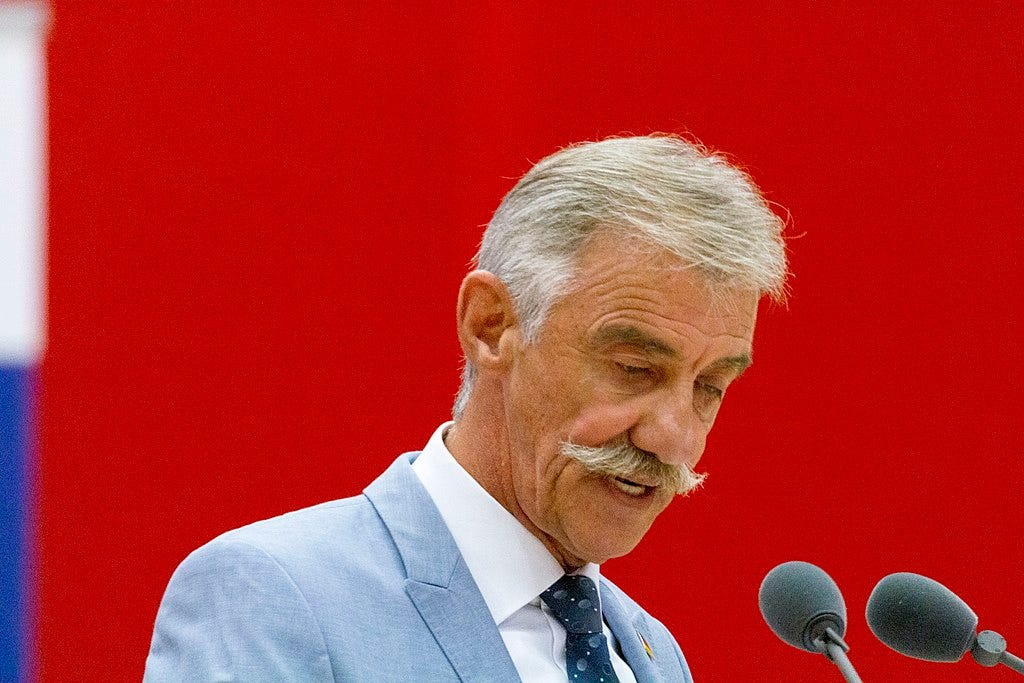Britain - rival or adversary?
A tough choice...
Glass houses/ stones
The AfD’s co-faction leader in the Bundestag, Alice Weidel, doesn’t fit the prototype of the gammon-faced elderly gent muttering about inner cities being full of foreigners these days.
She is a well-spoken and well travelled academic. And she is also openly gay.
Don’t be fooled though. Weidel knows how to push the AfD base’s buttons. One particular low point was a rant about “headscarf-wearing teenagers and other ne'er-do-wells” during a Bundestag debate on immigration.
That comment was just one in a long line of crude attacks on Muslims. It’s no coincidence that her invective has coincided with an increase in anti-Muslim hate crime.
When opponents haul her up on this, Weidel gives the ‘you can’t say anything these days’ response… more red meat to the party base.
But the former banker has discovered a new sensitivity around hurtful language in recent days, one that may come as a surprise to her followers.
The background is a decision by the city of Munich to light the Allianz Arena in the rainbow colours for Germany’s Euro 2021 game against Hungary - an act of protest against the Orban government’s ban on teaching about homosexuality in schools.
Separately, Germany’s team captain Manuel Neuer has been wearing a rainbow armband during the entire tournament.
Uwe Junge, former leader of the AfD in Rhineland-Palatinate and human moustachifestation of the AfD, tweeted that “the Allianz Arena will glow in rainbow colours at the Hungary game and Neuer is wearing the fag band instead of our national colours. They only need to take a knee and they’ll lose more and more fans.”
An appalled Weidel responded: “That isn’t the AfD! Uwe Jungs will soon be looking at the party from the outside.” In using the word Schwuchtelbinde (fag band) Junge had “clearly gone too far,” she said.
Poor old Mr Junge, you can’t say anything in the AfD these days.
Britain - rival or adversary?
I wrote recently about the bitterness that colours so much of the post-Brexit reporting on the UK in the German press. Everything done by a Remainer is automatically heroic (a retired MP switching sides to Labour this week was headline news), everything done by a Brexiteer is automatically evil.
Whether newspapers are preaching to the choir or actively fuelling anti-Englishness is hard to say. But a new poll by YouGov in cooperation with the European Council on Foreign Relations shows that a remarkable 20 percent of Germans now see the UK as a rival, while another six percent see it as ‘a country we are in conflict with.’ That is against 14 percent who see their island neighbour as an ally. (A small consolation for us Brits: 34 percent grudgingly accept us as ‘a necessary partner - someone with whom we must work strategically.’)
Germans are more likely than any other European surveyed to hold such a hostile view of the UK. While the British government certainly can’t be exonerated, this makes for depressing reading.
Ironically enough, the same polling showed a massive lost of trust by Germans over the past year in the EU over the same shortcomings that won Brexiteers the referendum (Brussels’ incompetence and inefficiency).
Karl der Großzügige
It took over 14 months, but SPD health spokesman Karl Lauterbach has finally admitted that his bullet-proof predictions don’t always turn out to be true.
Back in April, amid a highly emotional debate over the need for a new lockdown to end the “third wave”, Lauterbach dismissed the idea that warmer weather would do the job for us. “Of course no scientist believes that”, he said on primetime TV before adding that “I don't know of a single scientist of note, perhaps just one, who holds such a hope."
That wasn’t insignificant. After brewing their morning coffee and changing their underpants, scrolling through Lauterbach’s Twitter feed is top of the agenda of German journalists across the land. His predictions carry weight.
The “one scientist” he was referring to was Hendrick Steeck (see newsletters past and paster), head of virology at Bonn University and the one voice of sanity throughout the past year. Streeck said back in January that, just as with other seasonal viruses, infection rates will go down “at the latest in April” and “will only spread at a low level over the summer.”
Given that infections have stayed low despite the lockdown being rolled back, Lauterbach conceded that “I have to admit that Hendrick Streeck was completely right about seasonality.” In other words he was admitting that the Bundesnotbremse, which he was key to pushing through, had bugger all to do with the end of the third wave.
Not that this realisation knocked Dr. Karl off course for long. If you want to see a distillation of deutsche Angst into 280 characters, look no further than his Twitter feed.
J.L.





